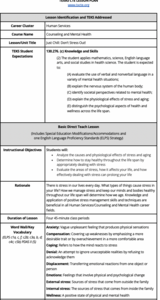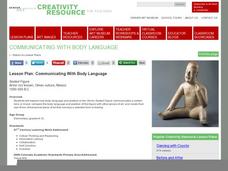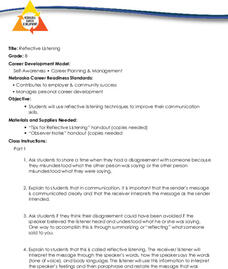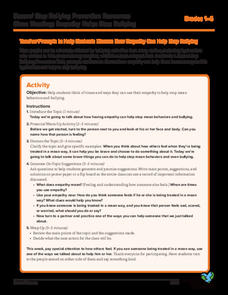Penguin Books
A Teacher's Guide to the Signet Classic Edition of The Crucible by Arthur Miller
A 20-page guide is a must-have for any instructor, seasoned veteran, or first year-teacher, using Arthur Miller's The Crucible as an anchor text. The guide begins with extensive background information about Miller and the McCarthy era...
Texas Education Agency (TEA)
Just Chill: Don’t Stress Out!
Billy Joel's song, "Pressure," opens a lesson that teaches some techniques to deal with pressure and stressors, significant factors that contribute to aging and poor health. Throughout the four-day lesson, participants study...
Texas Education Agency (TEA)
Road Blocks to Mental Health
According to the Center for Disease Control and Prevention (CDC), fewer than half of adults seek treatment for mental health disorders. Those interested in careers in mental health investigate why this is so by looking at the...
Curated OER
The Body Talks
Young historians examine the gestures of human subjects represented in Mannerist, Baroque and Renaissance paintings. After they play charades and attempt to match dialogue with body language, learners create a drawing that...
Curated OER
Lesson Plan: Communicating With Body Language
The Olmec were an ancient people native to Mexico who lived from 1000-500 BC. Young artists examine the Olmec piece Seated Figure to analyze the use of body language to communicate a tone or feeling. They then use clay or play-dough...
Curated OER
Non-Verbal Communication
Many developmentally disabled students struggle with accurately conveying messages and interpreting those of others around them, especially when they are non-verbal. This instructional activity contains fun activities and exercises, such...
Anti-Defamation League
Microaggressions In Our Lives
Defining, identifying, and learning how to counter microaggression is the lesson's focus for high schoolers. Learners examine a definition of the term, write about their own experiences with microaggression, watch short video examples,...
K20 LEARN
Friends, Romans, Countrymen, Lend Me Your Emotions: Julius Caesar
Scholars, high schoolers, class members! With the help of this instructional activity, you too can identify the three persuasive appeals (ethos, pathos, and logos) the characters in William Shakespeare's tragedy Julius Caesar...
Overcoming Obstacles
Using Communication Skills Effectively
Miscommunication is often the basis of conflict. To improve their communication skills, pupils first review what they learned about assertive (as opposed to aggressive or passive) communication, role-play several scenarios, and...
Overcoming Obstacles
Developing a Positive Attitude
Be positive! That's the take-away from a lesson about how a positive attitude influences actions and increases one's ability to succeed. To conclude the lesson, participants create a plan for how to respond positively to obstacles.
Overcoming Obstacles
Understanding Nonverbal Messages
The Overcoming Obstacles course for middle schoolers continues with a unit module on communication. In the first lesson, participants engage in a series of activities that help them recognize nonverbal clues and the importance of making...
Overcoming Obstacles
Learning to Be Assertive
After defining passive, aggressive, and assertive, class members role-play different scenarios demonstrating these behaviors. Individuals then identify a weakness they wish to improve and, using what they have learned throughout the...
Overcoming Obstacles
Communicating Constructively
Some conversations are easy and enjoyable, while others are horrific! To begin a lesson on communicating constructively, class members list examples of conversations that are easy, average, and those that are difficult and identify what...
Overcoming Obstacles
Understanding Nonverbal Communication
People communicate in all sorts of ways. As part of a study of nonverbal communication, teams of three must complete a puzzle without speaking to one another. After debriefing the activity and analyzing the messages nonverbal cues...
Lions Clubs International Foundation
Mindful Self-Awareness Exercise: Identifying Feelings
Young scholars identify feelings through facial expressions and body language. Learners listen for a feeling word, then act it out and discuss how they portrayed it.
Lions Clubs International Foundation
Mindful Self-Awareness Exercise: Identifying Feelings
Following a breathing exercise, scholars examine facial expressions and body posture to identify feelings. The exercise ends with a reflection.
Overcoming Obstacles
Giving and Earning Respect
RESPECT! High schoolers learn what it means, how to earn it, who deserves it, and why in the first of five lessons in this section of the Overcoming Obstacles course. After brainstorming a list of people they think to deserve respect and...
Lions Clubs International Foundation
Mindful Self-Awareness Exercise: Identifying Feelings
A self-awareness activity teaches pupils to identify their feelings by focusing on different parts of their bodies. Participants begin by focusing attention on their feet, then calves, moving up slowly to the top of their head, and...
Nebraska Department of Education
Reflective Listening
Reflective listening is not casual! After learning about the practice of reflective listening, middle schoolers practice reflective listening skills in a role play activity that has them take turns being a speaker, listener, and observer.
Nebraska Department of Education
Communication Skills
It's not just what you say but how you say it! That's the take-away from a lesson about verbal and non-verbal communication. An engaging activity has middle schoolers demonstrating how tone of voice and body language can totally...
Nebraska Department of Education
Mock Interviews
Completing a job application and sitting for an interview are essential parts of the job search process. High schoolers receive guidance as they fill out a job application and participate in mock interviews to prepare. They also access a...
Workforce Solutions
Actions Speak Louder Than Words
A short video demonstrates the importance of non-verbal communication in the forming of first impressions. Viewers observe the facial expressions, tone of voice, body language, and appearance of job seekers in an interview, then discuss...
PBS
Robot Body Language
Don't be so emotional! Scholars take part in an activity where they consider how future robots will be able to show emotions. They place paper bags over their heads, act out emotions through body movements, and have others guess the...
Committee for Children
Class Meeting: Empathy Helps Stop Bullying
A lesson instills the importance of how empathy has the ability to aid in stopping bullying behavior. Scholars discuss, in-depth, a series of three questions. Using class input, an anchor chart is made then displayed for reference.

























